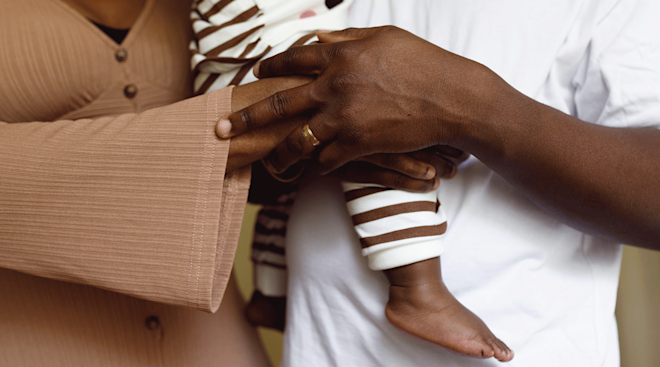8 Signs Your Marriage Needs Attention (and How to Fix It)
This is a bad news / good news kind of situation.
The bad news is that 70 percent of all couples experience a precipitous dip in marital satisfaction in the first three years of parenthood. And some couples never recover.
The good news? This is completely preventable and reversible. Science shows that, with the right tools, couples have a very high likelihood of staying happy and healthy in the midst of parenthood. The even better news? One couple (brand new parents themselves) took all those scientific tools and exercises and put them into a couples counseling app called Lasting to offer an easy, empowering way to help your relationship.
So how can you tell if your marriage is headed toward that cliff—and what can you do about it? Read on for eight warning signs to watch out for as you enter parenthood, plus expert advice from Liz Colizza, MAC, LPC, NCC, a seasoned couples and family psychotherapist and head of marriage research at Lasting, on how to not just survive but thrive in your relationship as new parents.
Sign #1: When everyday conflicts explode
We all get into little tiffs now and then, but when small disagreements (for example, why didn’t you do the dishes?) cause you to snap and prompt a major fight about something entirely different (say, financial debt from 10 years ago), it’s time to pause and take a closer look at what’s happening in your relationship.
Sign #2: When you’re finding it difficult to trust your partner
In all relationships, trust can be built and broken. In fact, Lasting data suggests roughly 32 percent of married people don’t trust their partners. But the good news is that it can also be rebuilt over time. If you’re finding it difficult to trust your partner, something must have happened in (or against) your relationship that damaged the sense of support and partnership you once felt. Trust is a key factor in your relationship—especially when you’re raising a child together, because the more trust you build, the easier it is to sacrifice and compromise for each other.
Sign #3: When you can’t forgive your partner
Don’t get us wrong—forgiveness isn’t easy, and you can’t force yourself to move past something if you’re just not ready. But if it’s been a while and you still find yourself unable to get over what your partner said or did (or didn’t do), then whatever happened is a big deal and needs more attention.
Sign #4: When you fight about the same thing over and over
Feeling stuck in conflict with your partner over the same issues is exhausting and infuriating. It can feel like you’re spinning your wheels and not getting anywhere. When partners get stuck, toxic patterns of relating can form and one or both partners can slip into unhealthy communication styles. This kind of conflict erodes relationships and makes partners feel disconnected and dissatisfied.
Sign #5: When your emotional connection feels “empty”
What do we mean by that? An empty connection feels different for different people. Some report not feeling “known” by their partner. Others feel their partner doesn’t understand them or doesn’t care. However it feels to you, underneath it all is a sense that your partner is incapable or unwilling to be there for you emotionally. According to a Lasting survey of 5,000 married people, only 34 percent felt they had a healthy emotional connection in their marriage—and that percentage dropped to just 28 percent of respondents who were parents.
Sign #6: When you or your partner constantly criticize the other
According to John Gottman, PhD, an American psychologist who did extensive research on divorce prediction and marital stability, this sign—and the two that follow—are biggies that can lead to divorce if not addressed. Using criticism as a communication style is when you attack your partner’s character by pointing out flaws. These kinds of attacks often include the words “never” or “always.”
Sign #7: When you or your partner attack the other with contempt
Contempt is a step beyond criticism, when one partner assumes moral superiority over the other. This can be in the form of name calling, mocking, sarcasm, eye rolling, disrespect and scoffing. When you’re treated with contempt, you often feel worthless and despised by that person.
Sign #8: When you or your partner shut down emotionally
In an extreme form, this can be called “stonewalling” and is often a response to contempt. Any kind of emotional withdrawal can do serious damage to your relationship. If your partner is doing this, it’s likely because they feel attacked, disrespected or unsafe in some way in the relationship.
It’s tempting to blame these relationship problems on the lack of sleep and boatload of new responsibilities you now have as parents. But researchers have determined that these warning signs stem from something deeper—what Sue Johnson, PhD, a psychologist who specializes in romantic relationships, has termed an “attachment injury.” Similar to a physical injury, an attachment injury is a wound in your relationship caused by your partner’s abandonment, rejection or betrayal during a crucial moment of need. Maybe it was something big and obvious, like not being supported by your partner during a miscarriage, or maybe it was something small and subtle, like not being included in an important family photo with their extended family.
Regardless of how big or small, when an attachment injury takes place, the emotional bond is damaged and the relationship begins to feel unsafe, insecure or unreliable, because basic trust has been broken. As a result, your relationship can suffer in various ways. In general, couples interact with increasing negativity, are less productive at problem-solving and become predictable in their patterns of relating to each other. This is especially true of conflicts, where partners feel stuck and unable to move past certain events. And instead of finding a resolution or compromise, both partners resort to destructive behaviors like criticism, defensiveness and withdrawal.
If you’re experiencing one or many of these signs, hold off on waving a white flag in defeat. Research resoundingly shows that change is possible, even for distressed couples. Here are four practical things you can do to help heal your relationship.
Step #1: Remind yourself this is normal
To start, remind yourself that every marriage evolves over time. All relationships have ups and downs, happy seasons and difficult seasons, agreements and disagreements. Every couple is in the same boat. For most people, marriage is harder work than they anticipated, but that doesn’t mean it isn’t worth the investment. Small changes over time make a huge difference.
Step #2: Reflect, then start a conversation
“In general, when your marriage is in distress, there are two big steps you can take,” Colizza says. “First, figure out how you feel about the distress. Then, initiate a conversation with your partner about what you see happening. A simple formula for starting this conversation is to say “I feel… My concern is… How do you feel about that?”
It’s important to figure out exactly how you feel before you initiate that talk. While you reflect, remind yourself that you’re on the same team. It’s your shared responsibility to nurture the relationship. Also, carefully consider your words, tone and volume when you start the conversation, since those things have huge sway over how the rest of the talk will go. Research shows that 96 percent of the time, if a conversation begins poorly, it ends poorly too. So prepare ahead of time.
Step #3: Choose to see yourself as a problem
We realize this calls for a lot of humility and courage, but choose to see yourself as the biggest problem in your marriage. “If you can do this, you’ll see areas where you can grow and change,” Colizza says. “You can’t control your partner and you can’t force them to change, but you can control yourself. Surprisingly, one of the best ways to influence change in others is to change yourself. So, one of the best ways to influence your marriage for good is by focusing on improving yourself.”
Step 4: If you need an intervention, seek out therapy
Marriage is hard work, and creating a healthy and successful marriage is a lifetime endeavor. It takes courage to admit you need help, but there’s no reason to feel even more alone when your marriage is in distress. Seek out guidance from a licensed therapist, or let Lasting be your lifeline. Through a customized counseling program designed just for you, the app can help heal your attachment injury and even teach you new healthy communication styles. And the more healthy skills you and your partner learn, the more resilient your marriage will become from future threats to your emotional bond. (Because let’s not forget: Your kid’s trying teenage years are coming.)
Never forget: Relationships can get tough as you enter parenthood, but it’s totally possible to thrive as a couple and experience even deeper levels of meaningful connection together.
Published December 2018
Plus, more from The Bump:
Navigate forward to interact with the calendar and select a date. Press the question mark key to get the keyboard shortcuts for changing dates.




















































